Welcome, Stranger!
By JACK WHITE Jack White is Features Editor of the Irish Times, and Dublin Correspondent of the Observer. His novel One for the Road is to be published later this month by Jonathan Cape.
0 NE of the oddest things about tourism in Ireland is the difficulty of getting people to regard it as an industry. Visitors come, of course—why not? They always have come to Ireland, and presumably they always will. They are regarded in general as a phenomenon as natural as the gentle rain from heaven; and the idea of stimulating the flow is gaining ground not very much more rapidly than the notion of bombarding the clouds with ice-pellets.
Yet tourism (the word is unpleasing but unavoidable) is big business to Ireland. After cattle, it is probably the country S largest money-maker—and it is not so very far behind cattle. In 1954, receipts from tourists were about £29.5 million, while exports of cattle brought in £33.9 million. In the same year the tourist industry earned more dollars than all of Ireland s visible exports put together—£3.2 million, against £2.8 million• Except among Tourist Board officials and a few hotel proprietors, there is as yet remarkably little awareness of these simple facts : certainly there is no trace of that caterer-to- customer attitude which seems to be almost congenital in the Swiss. And, in a curious way, this casual approach to the whole tourist business is one of the charms of Ireland. Indeed, out' side the principal centres the word 'tourist' itself is scarcely in normal currency. Tourists are people who whizz by In a big yellow bus; the people who come to stay a night or two are visitors—and there is a whole world of hospitality in the difference. Nowhere else on earth, I feel sure, can the stranger feel himself received so quickly into the community. The sense of adoption is so strong that many English visitors return year after year to the same Irish village, to be welcomed each time like members of the family coming home. To say that Ireland's greatest asset as a tourist country is the Irish people is easy, and sounds glib. But the officials whose business it is to analyse the comments of departing tourists can confirm that, to the majority of them, the strongest and most pleasant impression is of the friendliness of the people and the easy informality of Irish life. These are the things that bring the visitor back a second time. Today's problem is how to catch him the first time.
Immediately after the war, there was no difficulty. The Continent was still out of bounds, and Britain was rationed and austere : Ireland offered ample food and drink, without the tiresome formality of currency restrictions. When the tourist business got back into its stride on the Continent, it was clear that Ireland was competing for British visitors in a very keen market indeed. Some decline in the number of visitors from Britain was to be expected; but the decline has been surprisingly short-lived. American tourists have increased in number each year since 1951. A new feature of the traffic in the last couple of years is a perceptible increase in the numberof tourists from the Continent, especially Germans—many of them anxious to seek out the romantic country of The Playboy of the Western World and The Quiet Man.
Certain traditional features of the tourist pattern persist, of course. Americans still come to kiss the Blarney Stone and to see the thatched cabins of their ancestors (most of which have by now been replaced by less picturesque but more sanitary council houses). Fishermen still find that Irish rivers give good sport, and far more cheaply than Scotland; they come back year after year to the same solidly comfortable hotels, in the neighbourhood of the salmon and trout streams.
The post-war years have seen a big development in motor touring. The big obstacle here is the high cost of transporting cars across the Channel. This, one of the leading grievances of the Irish tourist caterer, has been offset to some extent by the rapid expansion of the self-drive car-hire business. The mobile tourist is at a great advantage in Ireland, since the most beauti- ful parts of the country—the mountains, the lakes and beaches of the western seaboard—are the .most inaccessible by public transport. Outside a few recognised centres such as Killarney, the tourists spread out thinly; it is still possible to enjoy the strange excitement of penetrating to a vast silver strand, a mile or more long, and finding it unscarred by a single foot- print. Even in Dublin, the motorist is only half an hour away from the lonely splendour of the Wicklow Mountains. So far the catering trade has done little to adapt itself to the motor tourist; his principal bases still are the established fishing hotels. There would be good business for a few interest- ing roadside restaurants, and possibly for `motels'—for a month or two in the year. But that is the reservation that limits all development : apart from the specialised visitors, such as the fishermen, the season proper lasts only for two to three months. To stretch the season, even by a few weeks, is the main job before the Tourist Board. It is the purpose of the not very successful spring festival, the Tostal, which comes in May this year; it is the reason behind a drive for the 'conference' trade which is certainly beginning to show results (the British Association, for instance, will meet in Dublin).
But perhaps the season's best, and least exacting, visitors have already been and gone. They came in red scarves and berets, 10,000 of them, to see Wales win the Triple Crown (in which they did not succeed), and stayed on to have a good time (in which they did). They stayed in boarding houses. where a decent bed and a big breakfast mattered more to them than cen. htg. and rng. wtr. h. & c.; they spent money freely in the shops and the pubs; and when they got drunk they didn't fight—they sang. Everybody loved them, especially the publicans.
They were not a bad sample of the visitor who makes the bread-and-butter of Ireland's tourist trade: much the same kind of people come from Glasgow and Manchester and Birmingham. to have much the same kind of good time. Thousands of them stay in private homes and boarding houses, all along the east coast. They pick their 'digs' at random from an advertisement in a local paper, without reference to Tourist Board lists, and some get stung; but, in general, they are well satisfied. They come because they like a 'foreign' atmosphere without the complications of a foreign language; because they enjoy cheaper drink and a way of living that is more relaxed and less earnest than the English.
But it does not do to be too relaxed in the tourist business. To keep this bread-and-butter traffic, Ireland's seaside resorts will need to think seriously about the provision of entertain- ment for the evening and for the wet day : small local casinos, with gambling on a modest scale, would fill a gap that is becom- ing increasingly obvious. The job of the industry now is to 'lay on' such simple amenities, without impairing Ireland's unique charm—the charm of the most uncrowded, unspoiled and unhurried country in Europe.



















































 Previous page
Previous page